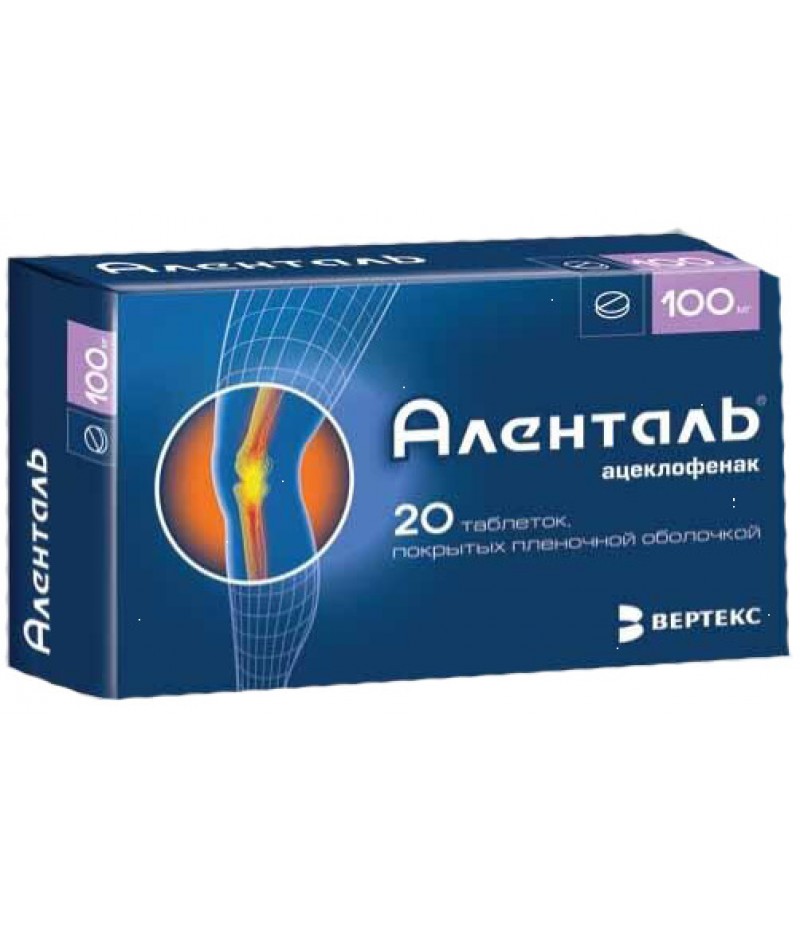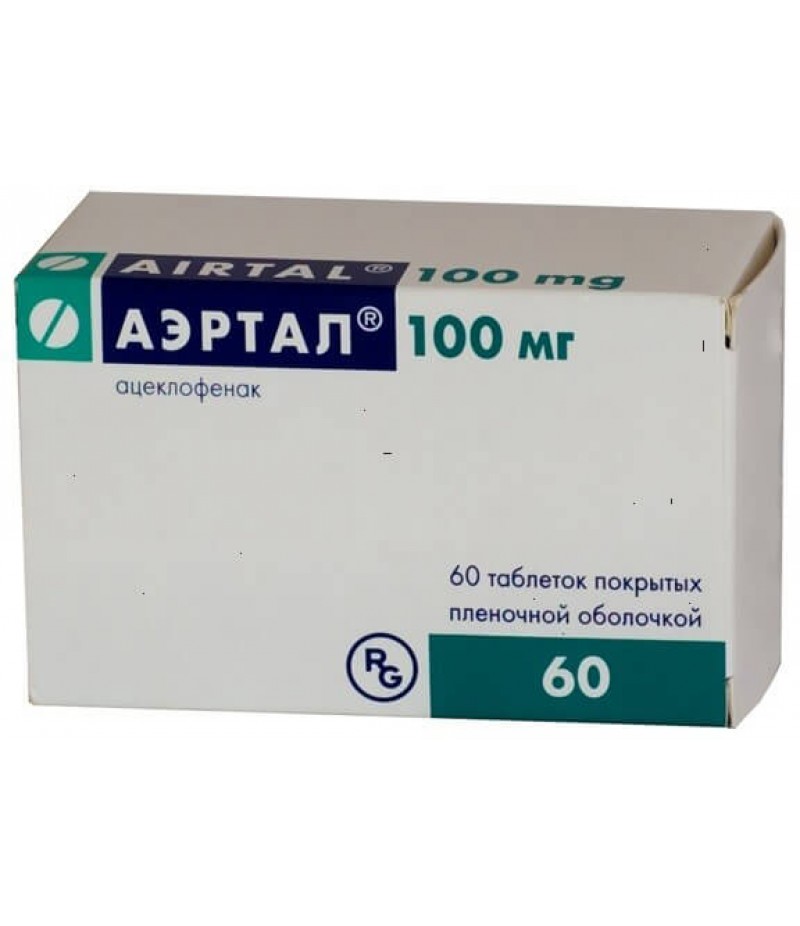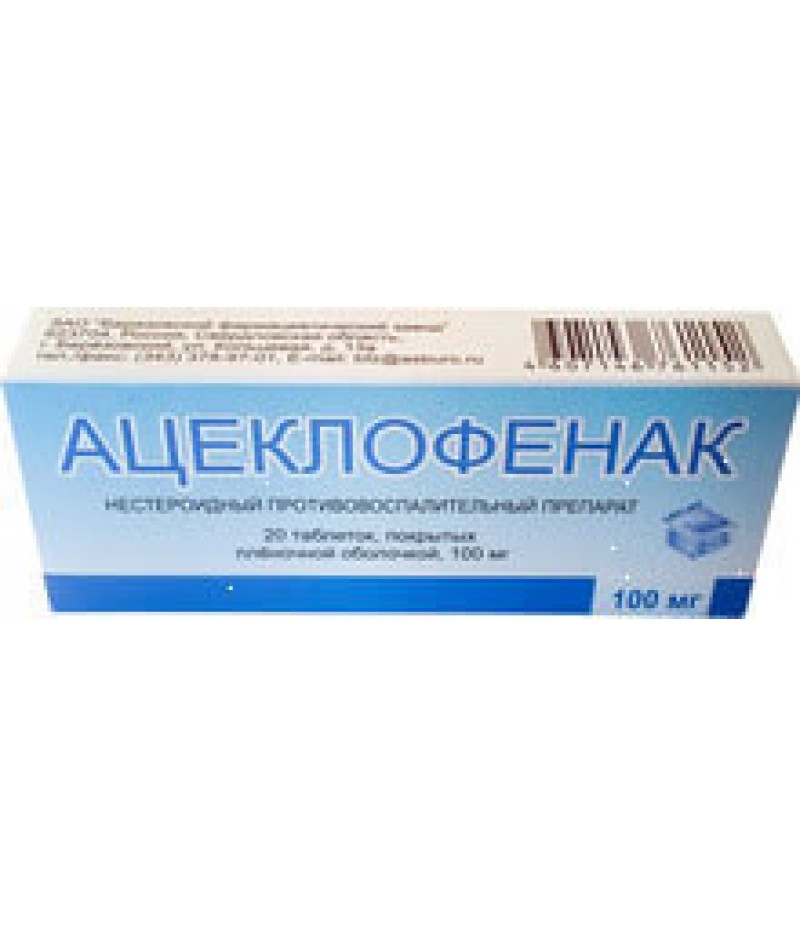Alental tabs 100mg #20
- $15.53
- 3 or more $15.19
- Availability:In Stock
Alental instruction for useReed more and buy Alental hereIndications for use- Curbing inflammation and pain syndrome with lumbago, toothache, humeropathy periarthritis, rheumatic soft tissue damage.- Symptomatic treatment of rheum..
Tags: tabs
Alental instruction for use
Reed more and buy Alental here
Indications for use
- Curbing inflammation and pain syndrome with lumbago, toothache, humeropathy periarthritis, rheumatic soft tissue damage.
- Symptomatic treatment of rheumatoid arthritis, osteoarthritis, ankylosing spondylitis.
Alental is intended for symptomatic therapy, reducing pain and inflammation at the time of use, the progression of the disease is not affected.
Active substance, group
Aceclofenac (Aceclofenac), NSAIDs
Dosage form
film coated tablets
Contraindications for Alental
- erosive and ulcerative lesions of the gastrointestinal tract (GIT) in the phase of exacerbation (including ulcerative colitis, Crohn's disease);
- Gastrointestinal bleeding or suspicion of it;
- complete or incomplete combination of bronchial asthma, recurrent nasal polyposis and paranasal sinuses and intolerance to acetylsalicylic acid or other NSAIDs (including in history);
- hypersensitivity to aceclofenac or drug components;
- a severe liver function disorder or active liver disease;
- disorders of hematopoiesis and coagulation;
- impaired renal function of a serious degree (creatinine clearance <30 ml / min), progressive kidney disease, confirmed hyperkalemia;
Decompensated heart failure;
- period after aorto-coronary bypass surgery;
- pregnancy and the period of breastfeeding;
- age to 18 years.
Alental is administered with caution to patients with the following diseases and conditions:
liver, kidney and gastrointestinal diseases in history; presence of Helicobacter pylori infection; bronchial asthma; arterial hypertension; decrease in the volume of circulating blood (including immediately after extensive surgical interventions); cardiac ischemia; chronic renal, hepatic and cardiac failure; creatinine clearance less than 60 ml / min; ulcerative lesions of the gastrointestinal tract in anamnesis; cerebrovascular diseases; dyslipidemia / hyperlipidemia; diabetes; diseases of peripheral arteries; smoking; elderly age; alcoholism; severe physical illness; in patients with hemostasis defects, with the risk of developing cardiovascular thrombosis (myocardial infarction, acute disorders of cerebral circulation (ischemic, hemorrhagic stroke)); systemic lupus erythematosus; long-term use of NSAIDs; simultaneous reception of glucocorticosteroids, anticoagulants, antiplatelet agents, serotonin reuptake inhibitors.
Dosing and Administration (Instruction)
Alental is used inside, swallowing the tablet whole, with a sufficient amount of water.
The drug should be taken for as short a period of time as possible. The course of treatment is prescribed by a doctor individually.
Usually, adults are prescribed one tablet of 100 mg twice a day (morning and evening).
Pharmachologic effect
Alental (aceclofenac) has an anti-inflammatory, analgesic and antipyretic effect. Oppresses the synthesis of prostaglandins and thus affects the pathogenesis of inflammation, the onset of pain and fever. In rheumatic diseases, the anti-inflammatory and analgesic effect of aceclofenac contributes to a significant reduction in the severity of pain, morning stiffness, swelling of the joints, which improves the functional state of the patient.
Side effects
Classification of the incidence of adverse events according to the recommendations of the World Health Organization (WHO):
very often> 1/10;
often from> 1/100 to <1/10;
infrequently from> 1/1000 to <1/100;
rarely from> 1/10000 to <1/1000;
very rarely <1/10000, including individual messages.
Violations from the blood and lymphatic system: rarely - anemia; very rarely - oppression of bone marrow, granulocytopenia, thrombocytopenia, neutropenia, hemolytic anemia.
Disorders from the immune system: rarely - anaphylactic reactions, including shock; hypersensitivity.
Disorders from the psyche: very rarely - depression, 'unusual' (atypical) dreams, insomnia.
Disturbances from the nervous system: often - dizziness; very rarely - paresthesia, tremor, drowsiness, headache, dysgeusia (perversion of taste).
Disorders from the side of the organ of vision: rarely - visual impairment.
Hearing disorders and labyrinthine disturbances: very rarely - vertigo, tinnitus.
Disorders from the cardiovascular system: rarely - heart failure, increased blood pressure; very rarely - tachycardia, skin hyperemia, "hot flashes" (short-term fever, accompanied by increased sweating), vasculitis.
Disturbances from the respiratory system, chest and mediastinal organs: rarely - shortness of breath; very rarely - bronchospasm.
Disorders from the gastrointestinal tract: often - dyspepsia, abdominal pain, nausea, diarrhea; infrequently - flatulence, gastritis, constipation, vomiting, ulceration of the oral mucosa; rarely - melena, ulceration of the mucous membrane of the gastrointestinal tract, hemorrhagic diarrhea, hemorrhage of the gastrointestinal mucosa; very rarely - stomatitis, vomiting of blood, perforation of the intestine, worsening of Crohn's disease and ulcerative colitis, pancreatitis.
Disorders from the liver and biliary tract: often - increased activity of 'liver' enzymes; very rarely - liver damage (including hepatitis), increased activity of alkaline phosphatase;
Disturbances from the skin and subcutaneous tissues: infrequently - itching, rash, dermatitis, urticaria; rarely - angioedema; very rarely - purpura, eczema, severe reactions from the skin and mucous membranes (including Stevens-Johnson syndrome and toxic epidermal necrolysis); in some cases, severe skin infections and soft tissue infections were observed when taking NSAIDs during a chicken pox disease.
Disorders from the kidneys and urinary tract: infrequent - increased concentrations of urea and creatinine in the blood plasma; very rarely - nephrotic syndrome, renal failure, interstitial nephritis.
General disorders: very rarely - increased fatigue, spasms of the muscles of the lower extremities.
Disorders from the metabolism and nutrition: very rarely - hyperkalemia, weight gain.
There is currently no evidence of an overdose of aceclofenac in humans.
Possible symptoms of an overdose: nausea, vomiting, pain in the stomach, dizziness, headache, hyperventilation with increased convulsive readiness. Assign lavage of the stomach, the introduction of adsorbents (activated charcoal), conduct symptomatic therapy. The effectiveness of forced diuresis and hemodialysis is not high enough.
Special instructions
Alendal and other NSAIDs should be avoided concomitantly, including selective inhibitors of cyclooxygenase-2 (COX-2).
Undesirable effects can be minimized by applying the minimum effective dose and reducing the duration of treatment needed to control symptoms.
Effect on the digestive tract
Bleeding, ulceration or perforation of the gastrointestinal tract with a lethal outcome were observed with the administration of any NSAIDs at any period of treatment, as if there were corresponding symptoms and serious gastrointestinal diseases in the anamnesis (peptic ulcer of the stomach and duodenum, Crohn's disease, ulcerative colitis, etc.), both and without them.
The risk of bleeding, ulceration and perforation of the gastrointestinal tract increases with an increase in the dose of NSAIDs in patients with a history of peptic ulcer, especially if it was accompanied by bleeding or perforation, as well as in elderly patients. Such patients should be given a minimum effective dose of aceclofenac. Also, in the treatment of these groups of patients and patients who require simultaneous use of low-dose acetylsalicylic acid or other drugs that may increase the risk of developing gastrointestinal complications, consideration should be given to the need for combination therapy with protector drugs (eg misoprostol or proton pump inhibitors ).
Patients with gastrointestinal diseases, including elderly patients, should report any unusual symptoms associated with the gastrointestinal tract (especially bleeding), including with the primary admission of Alental. Particular care should be taken in patients who are taking drugs simultaneously, which may increase the risk of bleeding or ulcers, such as systemic glucocorticosteroids, anticoagulants (such as warfarin), selective serotonin reuptake inhibitors, or antiaggregants (such as acetylsalicylic acid).
If there is gastrointestinal bleeding or ulcers, treatment with Alental should be discarded.
Effects on the cardiovascular and central nervous system
Patients with hypertension and / or congestive heart failure of mild or moderate degree need appropriate follow-up, since the administration of NSAIDs (in particular in high doses for prolonged use) may not significantly increase the risk of arterial thrombosis (eg, myocardial infarction or stroke). There is no reliable data on the absence of such risk in the administration of aceclofenac.
Patients with uncontrolled arterial hypertension, chronic heart failure, established ischemic heart disease, peripheral arterial atherosclerosis and / or cerebrovascular accident should be careful when taking Alental. Also, before the first intake of the drug, care should be taken for patients with risk factors for the cardiovascular system (eg, hypertension, hyperlipidemia, diabetes, smoking).
Effects on the liver and kidneys
Taking NSAIDs can cause a dose-related reduction in the formation of prostaglandins and acute renal failure. The importance of prostaglandins for the maintenance of renal blood flow should be considered when taking Alental in patients with impaired heart, kidney or liver function in patients receiving diuretics in patients after surgery, as well as in elderly patients.
Caution should be exercised in appointing Alental to patients with impaired hepatic and renal function of mild to moderate degree, as well as to patients with other conditions predisposing to fluid retention in the body. In such patients, NSAIDs can lead to impaired renal function and fluid retention. Patients taking diuretics, and people with an increased risk of hypovolemia should also be careful when taking the drug. It is necessary to appoint a minimum effective dose and regular medical monitoring of kidney function. Undesirable effects from the kidneys are usually resolved after discontinuation of aceclofenac.
Admission of aceclofenac should be discontinued if changes in liver function are preserved or worsened, clinical signs or symptoms of liver disease develop, or other manifestations (eosinophilia, rash) occur. Hepatitis can develop without prodromal symptoms.
The use of NSAIDs in patients with hepatic porphyria can provoke an attack.
Hypersensitivity and skin reactions
Like other NSAIDs, aceclofenac can cause allergic reactions, including anaphylactic / anaphylactoid reactions, even if it is taken for the first time. Severe skin reactions (some of which can be fatal), including exfoliative dermatitis, Stevens-Johnson syndrome and toxic epidermal necrolysis, were very rare after NSAID administration. The highest risk of occurrence of these reactions is observed during the first month of taking aceclofenac. In case of skin rash, damage to the oral mucosa or other signs of hypersensitivity, you should stop taking Alental.
In some cases, with chickenpox, skin and soft tissue infections may occur. At present, the role of NSAIDs in worsening of the course of these infections can not be ruled out. Therefore, you should avoid taking Alentalf with chicken pox.
Hematologic disorders
Aceclofenac can cause reversible inhibition of platelet aggregation.
Disturbances from the respiratory system
Care should be taken when taking the drug to patients with bronchial asthma in a history or with a current bronchial asthma, since the use of NSAIDs can provoke the development of sudden bronchospasm in such patients.
Elderly patients
Caution should be used when taking Alental in elderly patients, as they often have side effects (especially bleeding and perforation of the digestive tract) when taking NSAIDs. Complications can lead to death. Also, elderly patients are more likely to suffer from kidney, liver or cardiovascular diseases.
Long-term use
All patients receiving long-term treatment with NSAIDs should be closely monitored (for example, a general blood test, functional hepatic and renal tests).
Impact on the ability to drive vehicles and mechanisms
It should refrain from driving and other potentially hazardous activities requiring increased attention and speed of psychomotor reactions, as the drug may cause dizziness and other side effects that may affect these abilities.
Interaction
With the exception of warfarin, studies of drug interactions have not been conducted.
Aceclofenac is metabolized by the CYP2C9 isoenzyme; In vitro data show that aceclofenac may be an inhibitor of this enzyme. Thus, the risk of pharmacokinetic interaction is possible with the simultaneous administration of aceclofenac with phenytoin, cimetidine, tolbutamide, phenylbutazone, amiodarone, miconazole and sulfafenazole.
As with other NSAIDs, there is an increased risk of pharmacokinetic interaction with other drugs that are excreted by the active kidney secretion, such as methotrexate and lithium preparations.
Aceclofenac binds to a high degree with the albumin of the blood plasma and, therefore, there is the possibility of interactions by the type of displacement with other drugs that bind to proteins.
Below is the class-specific information for NSAIDs.
Methotrexate: NSAIDs inhibit the tubular secretion of methotrexate; moreover, a small metabolic interaction can occur, which leads to a decrease in the clearance of methotrexate. Therefore, when high doses of methotrexate are used, NSAIDs should be avoided.
Lithium and digoxin: some NSAIDs inhibit renal clearance of lithium and digoxin, which leads to an increase in the plasma concentration of both substances. Joint use should be avoided if frequent monitoring of the concentration of lithium and digoxin in blood plasma is not carried out.
Anticoagulants: NSAIDs inhibit platelet aggregation and damage the gastrointestinal mucosa, which can lead to an increase in the effect of anticoagulants and increase the risk of gastrointestinal bleeding while taking anticoagulants. Avoid the combined use of aceclofenac and oral anticoagulants coumarin group, ticlopidine and thrombolytics, unless careful monitoring of the patient's condition is performed.
Antiplatelet agents and selective serotonin reuptake inhibitors (SSRIs) when combined with NSAIDs may increase the risk of gastrointestinal bleeding.
Cyclosporin, tacrolimus: when taking NSAIDs with cyclosporine or tacrolimus simultaneously, the risk of increased nephrotoxicity due to decreased renal prostacyclin formation should be considered. Therefore, with simultaneous admission, you should carefully monitor the indicators of kidney function.
Other NSAIDs: concomitant administration of acetylsalicylic acid or other NSAIDs may increase the incidence of side effects, so caution should be exercised.
Glucocorticosteroids: the risk of developing gastrointestinal ulcers or gastrointestinal bleeding increases.
Diuretics: aceclofenac, like other NSAIDs, can inhibit the activity of diuretics, can reduce the diuretic effect of furosemide and bumetanide and the antihypertensive effect of thiazides. Joint reception with potassium-sparing diuretics can lead to an increase in the potassium content in the blood plasma. Aceclofenac did not affect the control of blood pressure when combined with bendroflaazide, although interactions with other diuretics can not be ruled out.
Hypotensive drugs: NSAIDs can also reduce the effect of antihypertensive drugs. Joint administration of ACE inhibitors or angiotensin II receptor antagonists and NSAIDs can lead to impaired renal function. The risk of acute renal failure, which is usually reversible, may increase in some patients with impaired renal function, for example, in elderly patients, or in dehydration. Therefore, when joint use of antihypertensive drugs with NSAIDs, care should be taken. Patients should consume the necessary amount of fluid and be under appropriate supervision (monitoring kidney function at the beginning of the joint application and periodically during treatment).
Hypoglycemic agents: Clinical studies show that diclofenac can be used in conjunction with oral hypoglycemic agents without affecting their clinical effect. However, there are some reports of hypoglycemic and hyperglycemic effects of diclofenac. Thus, when taking aceclofenac, you should correct the dosage of drugs that can cause hypoglycemia.
Zidovudine: with the simultaneous administration of NSAIDs and zidovudine, the risk of hematological toxicity increases. There is evidence of an increased risk of hemarthrosis and hematomas in HIV-positive (HIV-human immunodeficiency virus) patients with hemophilia receiving zidovudine and ibuprofen.
Mifepristone: aceclofenac can be used 8-12 days after taking mifepristone, since NSAIDs reduce the effect of drugs of this group.
Kolestyramine: other medicines, including NSAIDs, should be used at least 1 hour before or 4-6 hours after the administration of colestyramine to reduce its effect on drug absorption.
Terms of sell
You don't need a prescription to buy Alental.



